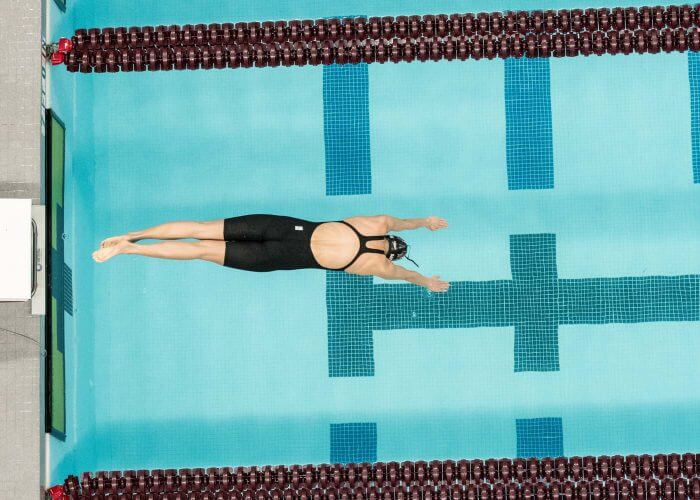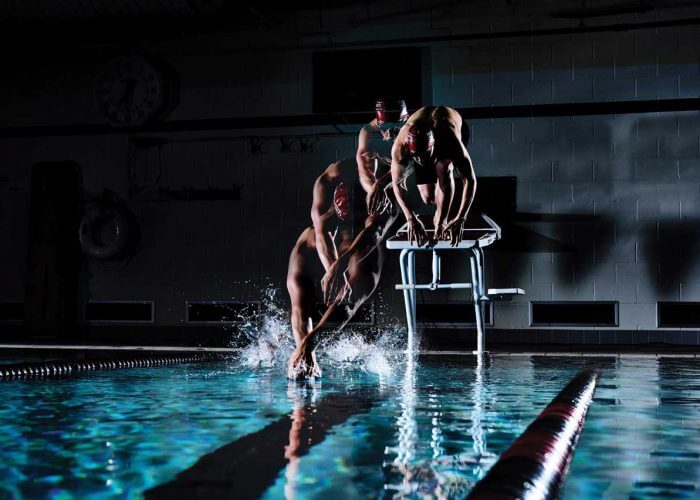The 3 R’s of Post Season

By Chris Balbo, Swimming World College Intern.
So your championship meet has gone one of three ways: amazing, mediocre, and horribly wrong. No matter the outcome, all of these groups of swimmers can be feeling burnt out or like they need more time to process the season. Regardless of the ending, the offseason is a time to reflect, recharge, and re-engage in swimming. The following are a few ways to get your head back in the game after your big meet.
1. Reflect

Photo Courtesy: Thomas Campbell/Texas A&M Athletics
Looking back on the previous season can be helpful to evaluate where a swimmer can improve. Even the swimmer with a spectacular season can find ways to get better: take one less breathe, one less stroke, or one more underwater kick. At the elite levels of the sport, races come down to every hundredth making the little things that much more critical.
The work in the pool is not the only component of swimming well. Competing in the kitchen, weight room, and off the deck are important factors contributing to time drops. The most overlooked way to improve is adjusting meet and practice mentality. Recent psychological research has incorporated the mental aspects of performance. Looking at pre-race thoughts or practice mindset and how to tweak them to be assets to performance as opposed to negative self-talk. Meeting with your coaches to discuss goals, mishaps, and areas for improvement are imperative, however, some self-reflection must be done beforehand. The outlook for the next season can always be bright.
2. Recharge

Photo Courtesy: YouTube’s BFvsGF Jenna&Julian
In swimming, time off is usually frowned upon due to a loss of feel for the water. But a break from the sport goes hand and hand with reflection. Identify the elements of swimming that are enjoyable. It is common after poor performance that a swimmer or athlete falls out of love with the sport. They might be frustrated, so allowing the mind and body to recharge is vital.
Some strategies to help recharge the swimming battery can include going outside, running, playing an intramural sport or taking up a new hobby. These activities distract from swimming, allowing a swimmer to miss the sport and rediscover their love of the sport. An unfavorable option is to wallow in feelings of discontent. Keeping pessimistic thoughts to yourself can harm performance. Communication with the coaching staff and teammates can help dissatisfied swimmers find their way back to the water.
3. Re-engage

Photo Courtesy: S.R. Smith
Now it is time to dive in. If pressed for time, treating swimming as pure exercise can be beneficial. Going to practice is your exercise for the day. By not thinking about the times and just viewing swimming as an intense workout, swimmers fall back in love with swimming. The hours put into training can be seen as a part-time job of staring at a black line for 20 hours a week. At times it may not be the most fulfilling job, but treating swimming as a job or task that must be completed can reinvigorate the passion for the sport. Treating swimming as a job or task should not be used for long period of time. Resources such as sports psychologists, the coaching staff, and the team support system are there to catch you. Re-engagement with the sport can be a long process, but any swimmer knows that the team around them would feel lost without a member.
Swimming is not as clean-cut or simple as it can be made out to be. It is only staring at a black hour on end, how hard could it be? But, taking your eyes off of the black line for a second makes swimmers realize how incomplete their lives feel without it. The postseason is a critical moment where changes can be made. Take time to reflect, recharge and re-engage for a spectacular season to come.
All commentaries are the opinion of the author and do not necessarily reflect the views of Swimming World Magazine nor its staff.



